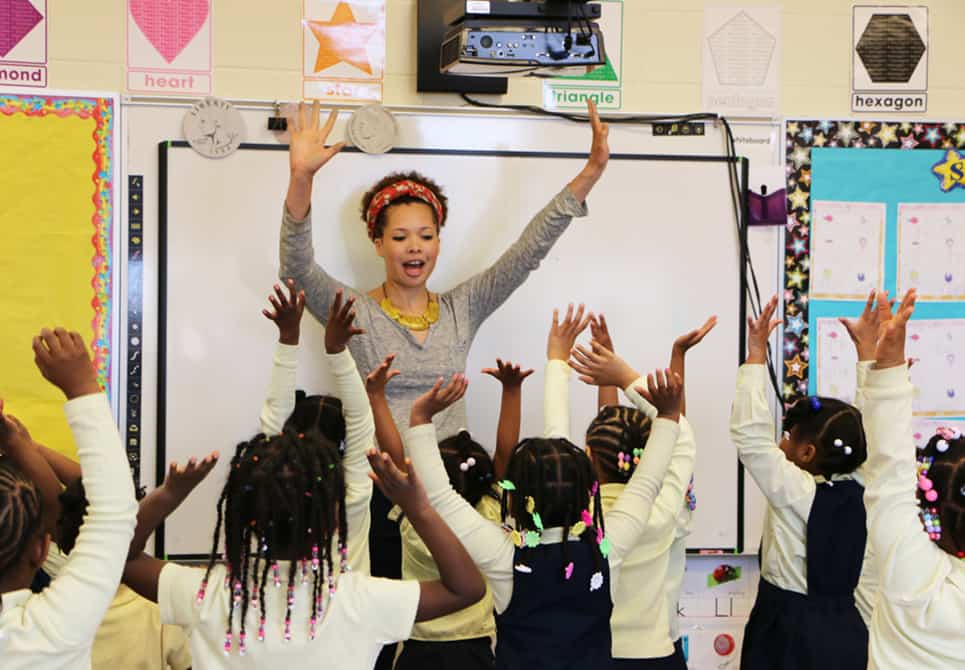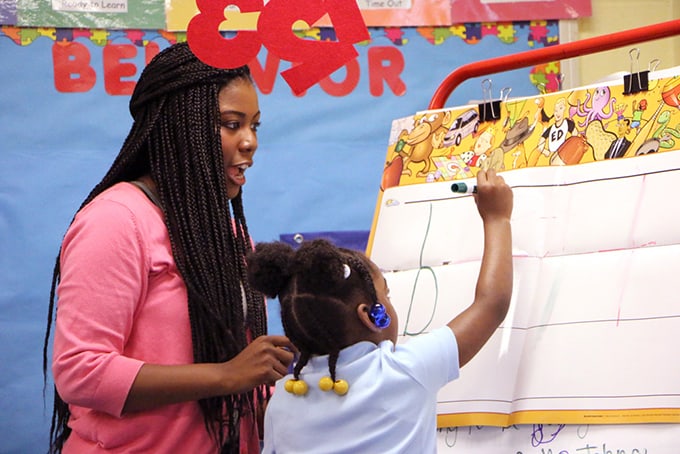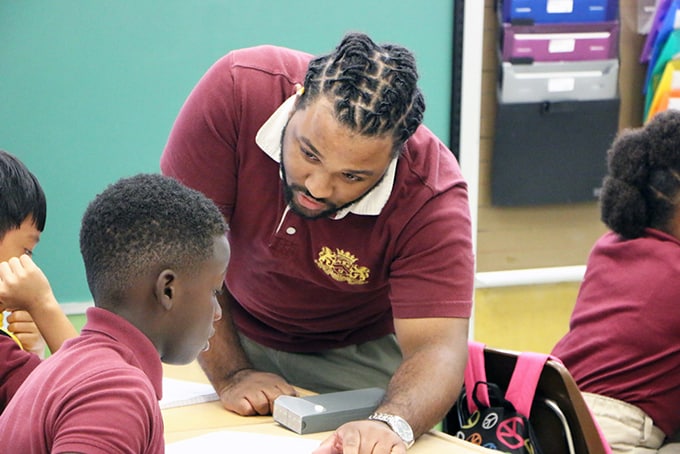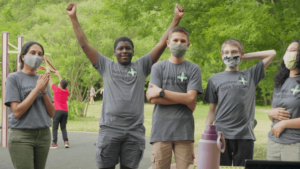Teacher Talent 2.0: Real-time PD, Data Use, Broadening Recruitment Pools

Jennifer Green
Great teachers change lives. They inspire and empower their students, acting as their springboard and skyrocketing them toward a bright future. Yet too many students—particularly in high-need urban schools—do not have consistent access to the best educators. Instead, they often sit in their classrooms trying to learn from new teachers that are still learning themselves—teachers that aren’t fully equipped to improve their achievement.
Improving teacher quality can change the course of thousands of students’ lives in our urban school systems—students whose future success as adults can drastically improve our economy and country.
Thankfully, over the past year, we’ve witnessed an increased focus on developing high-quality and consistent pipelines of great educators into the teaching workforce. If we entice the best candidates to enter the profession and improve the rigor of training they receive, new teachers will be ready to improve student learning on day one in the classroom. They will no longer be learning alongside their students, but facilitating their own students’ learning as high-performing professionals. And, because they are well trained for urban classrooms, they are likely to stay in the profession, lowering the teacher turnover that is so harmful to school culture and student achievement.
Right now, we’re far from reaching this aspiration. So how can the education community collaborate to bring a pipeline of more highly qualified teachers into the urban teaching workforce?
Broaden the pool of prospective teachers through real-life experiences
Most professions start cultivating their future staff well before a person is actually ready to begin the job.
Pre-job experiences—like the ones provided on the path to becoming a doctor, which have high entry standards and require a lengthy commitment to training—are necessary for cultivating talented and committed new professionals to a field. College students training to become educators need exposure to the challenges and rewards of a career. Yet urban teaching—a high stakes and demanding profession—is lacking in adequate pre-service opportunities that give candidates a firsthand look at the life of an educator.
City Year is one model that provides an opportunity to work in an urban classroom with students before committing to becoming a teacher. For some individuals, the experience helps them realize that teaching is not a good fit, weeding out candidates that should never enter the profession. For others, it builds interest in teaching as a career, as they realize it can be a rewarding and successful one.
If we want to grow the number of highly talented candidates that enter the teaching workforce, we need a similar model of cultivating candidate understanding and interest in teaching much earlier in their education experience. If candidates view teaching as a desirable career path, more of our best and brightest young professionals will be willing to commit time to their preparation, and as a result, thrive as career teachers.
Collaboratively work to share best practices across institutions; use data to inform effectiveness in teacher preparation programs
Teacher training programs across the nation have good intentions. Despite these good intentions, there is too much variety in entry standards, coursework, clinical preparation, and faculty qualifications; this has resulted in inconsistent performance of teacher graduates. To change this, we need to set consistent standards, share best practices, and hire quality faculty to ensure that all candidates get the training they need to be effective teachers.
Urban Teachers recently formed a new partnership with the Johns Hopkins University School of Education to do just this. By pairing a top-ranked master’s program with extensive support and classroom experience, the teachers we develop together will be ready to lead classrooms from day one, specifically in low-income and minority schools. Building on each other’s best practices, Urban Teachers and the School of Education will deliver a clinically-based residency program, similar to Johns Hopkins’ proven model for preparing doctors, that provides in-class experience to practice and master teaching techniques before becoming responsible for their own class of students. The model gives aspiring teachers the content knowledge and real-life experience working in urban classrooms needed to improve student learning.

But it’s not enough for teacher providers to collaborate with one another to develop effective educators. Teacher preparation programs need to work with the districts they are serving to ensure students are getting the teachers—and education—they need. To do this, all preparation programs should be transparent about the effectiveness of their teachers. Access to data is the only way to make meaningful and informed improvements to our programs, and to ensure that districts can knowledgeably choose from high-quality teacher pipeline options.
Provide targeted, real-time professional development for teachers (and find the people to deliver it)
Once educators enter the classroom, real-time supports and targeted professional development are also critical to their continued success. Educators need more than just your typical professional development workshops, they need deeper learning experiences to improve their practice, in conjunction with high quality, online and blended learning opportunities.
The most successful professionals are continuous learners, individuals who relentlessly look for ways to improve their performance in a job, and take advantage of opportunities for deep professional development. Teaching is no exception. Teachers, specifically in their first few years on the job, need individualized support and guidance to ensure they are growing and successfully leading their classrooms, taking advantage of new technologies and resources that can improve their instruction and most importantly, ensuring every student in their classroom is learning.
To successfully provide the professional development and support our educators need, we must invest in developing an increased number of Clinical Faculty. These master educators provide our new teachers with the high-quality, real-time coaching and mentoring that ensures they are effective in their classrooms. New teachers, specifically, need multiple years of real-time feedback from Clinical Faculty that includes actionable steps for improvement and helps them develop a process for reflection and growth. Great teachers are always looking to improve their craft, and they need expert Clinical Faculty to guide them.
We must make a commitment to continue to invest in teacher development even after candidates enter the profession. And to ensure they are getting the support needed to grow, we must hire and retain the high-quality coaches and mentors that can provide meaningful feedback to new teachers.
Create performance-based opportunities for growth
Even for the most passionate individual, someone who gains joy and fulfillment from working with kids all day, teaching is a career. And like other careers, teachers need to feel valued in their work. To keep our talented new educators in the classroom, we need to give them opportunities for growth based on their performance, including fair compensation.
To retain highly effective teachers, districts must reward them for their successes and provide leadership opportunities, where they can use their work in the classroom to help their teacher peers, strengthen curriculum and learning experiences for students, and advocate for ways to improve the entire profession. Modernizing the compensation structure is a factor in retention and can provide incentives amid the demands and challenges of the classroom.

Moving forward
Preparing the next generation of educators will require action at various points along the teacher pipeline by all of us in the education field. Increasing the talent pool, collaboratively working together to refine best practices, supporting teachers in the classroom and improving retention will make a significant difference in the quality of all teacher preparation programs, and as a result the achievement of our students. Let’s give teachers the tools needed to thrive in urban classrooms and students the futures they deserve.
Jennifer Green, Chief Executive Officer & Co-Founder of Urban Teachers. Follow Urban Teachers @Urban_Teachers.
For more on talent:
- Connecting Talent with Opportunity: Better HR Platforms and Career Education
- Building a “Smart” Talent Pipeline
- Getting Smart Podcast | Tom Vander Ark on Why Talent Matters
Stay in-the-know with all things EdTech and innovations in learning by signing up to receive the weekly Smart Update.





Dave Saba
With teacher shortages seemingly everywhere right now - how do you see the ESSA Teacher Academies and equitable distribution helping the situation?
Seems like the timing is right for alternative teacher certification programs to expand to bring more career changers into the classroom.